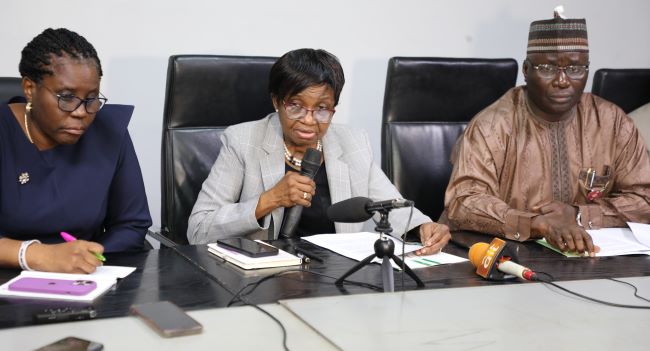In a decisive move to regulate drug distribution and combat substandard medicines, 1,370 wholesale medicine outlets in Kano’s open drug markets were sealed following a landmark ruling by Justice Simon Amobeda of the Federal High Court.
The February 16, 2024 judgment mandates the relocation of all drug marketers from the chaotic markets of Sabon Gari, Malam Kato, and Mai Karami to the Coordinated Wholesale Centre (CWC) in Dangwauro on Zaria Road. The Pharmacy Council of Nigeria (PCN) and the National Agency for Food and Drug Administration and Control (NAFDAC) spearheaded the enforcement action on February 17 and 18 to ensure compliance with the National Drug Distribution Policy. The sealed outlets’ owners have been instructed to report to NAFDAC and PCN offices at the new facility to commence the relocation of their businesses.
Nigeria’s chaotic drug distribution system and open drug markets pose significant challenges to regulatory agencies like NAFDAC, contributing to the prevalence of Substandard and Falsified (SF) medicines. These issues undermine drug efficacy and lead to treatment failures and fatalities. To address this, NAFDAC and PCN are intensifying efforts to combat SF medicines.
Reform efforts began in 2003 with the Presidential Committee on Pharmaceutical Sector Reform (PCPSR), which introduced strategies to sanitise the drug distribution system. A key initiative was the establishment of CWC to relocate and monitor open drug markets in cities like Kano, Lagos, Onitsha, and Aba.
The National Drug Distribution Guidelines (NDDG), a PCPSR recommendation, mandate regulatory agencies to enforce compliance, with support from leaders like the former health minister Prof. Isaac Adewole, who set a relocation deadline in 2018. These efforts aim to streamline drug distribution and improve public health outcomes.
Registrar of PCN, Pharm. Ibrahim Babashehu Ahmed, at a press briefing on the relocation of open Drug marketers to the coordinated wholesale centre (CWC) on Tuesday in Lagos, said the establishment of the CWC in Kano marks a turning point in the regulation of drug distribution and sales across the country. “This is a monumental achievement,” Ahmed said, speaking about the recent court judgment mandating the relocation of drug marketers in Kano to the CWC in Dangwauro. “The decision by Justice Amobeda paves the way for better control of drug distribution, a critical step toward ensuring the safety and health of Nigerians.”
In the same vein, the director-general of NAFDAC, Prof. Mojisola Adeyeye, has emphasised the agency’s unwavering commitment to safeguarding public health following the recent enforcement action in Kano. Speaking on the court-ordered relocation of open drug markets to the CWC in Dangwauro, she described the move as a landmark step in ensuring the safety, quality, and efficacy of medicines in Nigeria.
“The relocation to CWC is not just a regulatory step; it is a life-saving initiative to protect Nigerians from substandard and falsified medicines,” Adeyeye said while highlighting the critical role of the CWCs in eliminating unsafe medicines and creating a safer drug distribution system nationwide. She lauded the ruling by Justice Simon Amobeda of the Federal High Court, which directed open drug marketers to move their operations to the CWC. “This landmark judgment is a victory for public health. It reinforces our commitment to protecting Nigerians from the dangers of unregulated drug markets,” she stated.
She also noted that the enforcement action, which led to the sealing of 1,370 wholesale medicine outlets across Sabon Gari, Malam Kato, and Mai Karaimi, was a collaborative effort with the PCN. “Our partnership with the PCN is critical in achieving a safer drug distribution system. Together, we are taking decisive actions to rid the market of unsafe medicines,” she added.
Reflecting on the broader implications of the relocation, Adeyeye stressed the economic and health benefits for the nation. “Healthy citizens are the foundation of a strong economy. By removing substandard and falsified medicines from circulation, we are not just protecting lives; we are also boosting Nigeria’s economic potential,” she said. The DG encouraged medicine distributors to see the move as a positive change for the sector. “I urge all medicine distributors to embrace this transition as a positive step for public health. Compliance with these regulations is not optional—it is a necessity for the health of our nation,” she remarked.
She reaffirmed NAFDAC’s determination to sustain these efforts, emphasising that the enforcement in Kano was part of a broader strategy to clean up drug distribution across Nigeria. “This is just the beginning. NAFDAC will continue to lead the charge for a safer and more regulated pharmaceutical sector, ensuring that Nigerians only have access to trusted medicines,” Adeyeye averred.
We’ve got the edge. Get real-time reports, breaking scoops, and exclusive angles delivered straight to your phone. Don’t settle for stale news. Join LEADERSHIP NEWS on WhatsApp for 24/7 updates →
Join Our WhatsApp Channel










